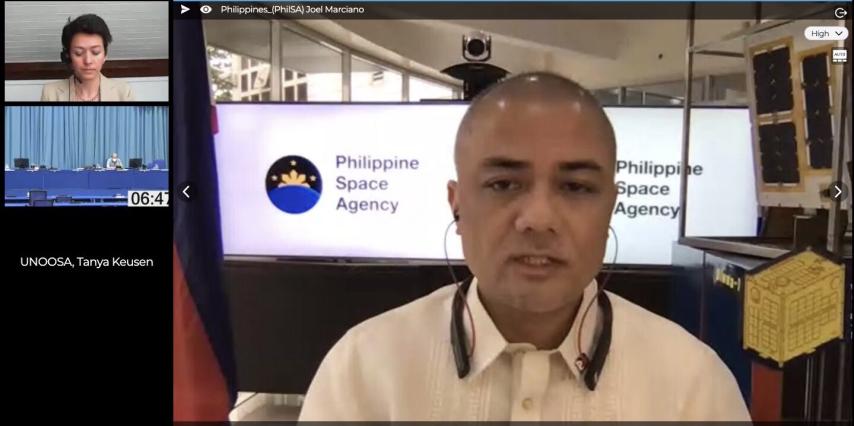Philippine Space Agency (PhilSA) Director General Joel Joseph S. Marciano, Jr., Ph.D. delivered the Philippine National Statement under Agenda Item No. 3 “General Exchange of Views” during the plenary of the 58th Session of the Scientific and Technical Subcommittee (STSC) of the United Nations Committee on the Peaceful Uses of Outer Space (UN COPUOS) held on 22 April 2021 in hybrid format.
The Philippine National Statement highlighted the Philippines’ efforts “to develop local capabilities in space that address the sustainable development goals and the challenges we face today” as well as PhilSA’s aspirations for the Philippine space program. It also emphasized the Philippines’ continued support to the work of the UN Office for Outer Space Affairs (UNOOSA) as well as to the COPUOS and its Subcommittees.
The 58th Session of the STSC, which began on 19 April 2021 and will end on 30 April 2021, will oversee discussions on an 18-point agenda composed of relevant topics on the scientific and technical aspects of space activities around the world. The occasion also serves as an important platform for member states including the Philippines to establish cooperation mechanisms in space and strengthen existing relationships with other space-faring nations.
The Philippine Delegation representing the country in this forum is led by Dr. Marciano. He is joined and supported by representatives from PhilSA, the Philippine Embassy and Permanent Mission in Vienna, and the Department of Foreign Affairs (DFA).
Here is Director General’s full statement:
58TH SESSION OF THE SCIENTIFIC AND TECHNICAL SUBCOMMITTEE OF THE UNITED NATIONS COMMITTEE ON THE PEACEFUL USES OF OUTER SPACE
PHILIPPINE NATIONAL STATEMENT
AGENDA ITEM NO. 3 “GENERAL EXCHANGE OF VIEWS” | 22 APRIL 2021
delivered by
JOEL JOSEPH S. MARCIANO, JR.
DIRECTOR GENERAL OF THE PHILIPPINE SPACE AGENCY (PhilSA)
Thank you, Madame Chair.
The Philippines extends its appreciation to you, Madame Chair, as well as to Director Simonetta di Pippo and her dedicated staff at the UN Office for Outer Space Affairs, for the excellent arrangements toward the 58th Session of the Scientific and Technical Subcommittee. Please be assured of my delegation’s full cooperation and active participation.
Before I proceed, the Philippines would like to take this opportunity to congratulate the United States, Japan, the United Arab Emirates, the People’s Republic of China, and ESA on their recent successful space exploration missions. We also wish to congratulate fellow developing countries who are taking their first steps toward becoming space-faring nations, including Paraguay, which successfully deployed its first cube satellite recently
Madame Chair,
It is my great honor to speak before you again today, officially this time as the first Director General of the Philippine Space Agency or PhilSA, which is participating in the STSC for the first time following its formal establishment. Driven by our mandate to serve as the central government agency that will develop and promote the national space program and our vision of a nation bridged, uplifted, and empowered through the peaceful uses of outer space, we actively seek to develop local capabilities in space that address the sustainable development goals and the challenges we face today. Please allow me to share some highlights:
In March 2021, the Philippines’ second cube satellite and fourth small satellite overall, Maya-2, was successfully deployed from the International Space Station through JAXA’s Kibo module. Maya-2 was developed by Filipino scholars under the auspices of the BIRDS-4 Project together with Japan’s Tsuru and Paraguay’s GuaraniSat-1 cube satellites. Maya-2 will soon be followed by Maya-3 and Maya-4 which are currently being built locally by Philippine universities with the support of the Philippine government.
We also highlight our country’s initiatives on mobilizing space data such as satellite images for enabling digital inclusion, national security, and socioeconomic development. With government support, the Philippines has embarked on several projects utilizing spaceborne data, artificial intelligence, and remote sensing techniques for object identification, monitoring, mapping, and change detection. These efforts have benefitted the country’s priority areas such as disaster response, maritime domain awareness, natural resource monitoring, and measuring the socioeconomic and environmental impacts of the COVID-19 pandemic to cite a few.
Madame Chair,
As we continue to build PhilSA and the Philippines’ national space program, we intend to pursue various modes of international space cooperation to enable activities and engagements that complement our national policies and local efforts. In this regard, we look forward to finalizing space cooperation agreements with the UNOOSA and with Japan, and we continue to explore avenues for cooperation with other international partners with emphasis on capacity-building and joint research and development.
We wish to express our support and reaffirm our continued participation in the work and efforts of the COPUOS and its Subcommittees, the UNOOSA Programme on Space Applications, and UN-SPIDER. My delegation also expresses its hope that we will be able to convene and commence the important work of the Working Group on the Long-Term Sustainability of Outer Space Activities.
Finally, we strongly encourage and support initiatives that enable the full and equal participation of women especially in global scientific and diplomatic efforts in the peaceful uses of outer space. In this regard, we wish to express our support for the Space for Women project and thank UNOOSA for participating in the webinar entitled “Making Space for Women: Advancing Gender Equality in the Philippine Space Sector” organized by the Philippine government on the 29th of March 2021.
To conclude Madame Chair, we wish to reiterate our steadfast resolve to establish partnerships and foster relationships that enable the peaceful, responsible, and sustainable use of outer space for the benefit of all humanity, and we will continue to engage with all international partners, taking into consideration our shared commitment and principles.
Thank you very much and a pleasant day to all.
— END —




